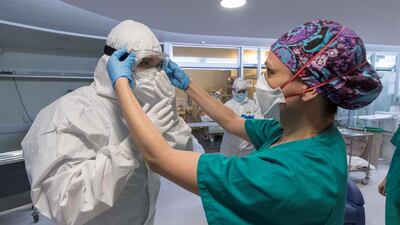As the coronavirus pandemic continues to take its toll, crossing 200,000 deaths and 2.7 million people infected across the world, the World Health Organisation has formed a much-needed global alliance to speed up the development of a vaccine and make sure that, once developed, it becomes available to all.
This is a welcome initiative for people everywhere in the world, not just in countries that are collaborating in this effort.
While several human trials are already under way in countries not limited to the US and the UK to find a cure, a joint mission such as this one, grounded in science and transparency, is the way forward.
It is imperative for our collective future that once a vaccine is found, it be made accessible and affordable to all, regardless of income, ethnicity or geography. There must be no discrimination.
"This is a landmark collaboration to accelerate the development, production and equitable distribution of vaccines, diagnostics, and therapeutics for Covid-19," said WHO Director-General Tedros Adhanom Ghebreyesus. "The world needs these tools and it needs them fast. In the past, they have not been available to all. That cannot be allowed to happen again."
Among the world leaders backing the WHO initiative are German Chancellor Angela Merkel, South African President Cyril Ramaphosa, French President Emmanuel Macron who urged all G7 and G20 nations to get behind the initiative, and among other stakeholders, the Bill and Melinda Gates Foundation.
International collaborations between governments, non-government organisations and the private sector are vital for the advancement of healthcare.
Just last week, Sheikh Mohamed bin Zayed, Crown Prince of Abu Dhabi and Deputy Supreme Commander of the Armed Forces, spoke with Bill Gates about the global spread of Covid-19 and discussed ways of co-ordinating humanitarian work between the UAE and the foundation to help the international community.
The UAE hosted the "Reaching the Last Mile" forum in 2017 and 2019, when Sheikh Mohamed, the British government and the Bill and Melinda Gates Foundation established a $100 million fund to fight diseases that afflict millions worldwide.
Despite the world's two largest economies, US and China, sitting out of the global alliance – as are Russia and India – other big stakeholders have pledged their backing, including the UK, saying it would support the landmark push for equal access to treatments for the virus. Spain's Prime Minister Pedro Sanchez, too, voiced strong allegiance to the WHO.
The global collaboration will be bolstered in the coming weeks by a critical inflow of funds. European Commission President Ursula von der Leyen said that the objective at a global pledging effort on May 4 would be to raise €7.5 billion to ramp up work on prevention, diagnostics and treatment.
Amid these significant collaborative efforts, there is a worthy focus on not repeating past mistakes, as stated by Mr Ghebreyesus. In 2009, during the H1N1 swine flu pandemic, there was an outcry that vaccines were more readily available to wealthier countries who bought more of them. Such injustices should not be repeated. In this regard, the WHO's emphasis and prioritising of equitable distribution is especially commendable and beneficial to the weakest and most vulnerable. As Bill Gates wrote in these pages earlier this month: "In this pandemic, we are all connected. Our response must be, too."


